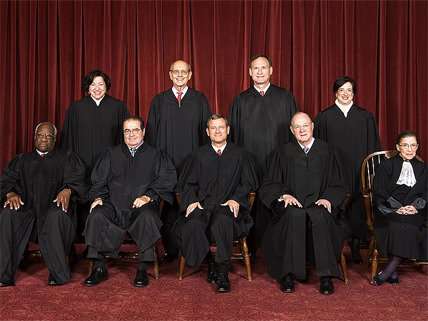Now Pending Before SCOTUS: Regulatory Scheme That Lets Government Seize Raisin Crops Without Paying Just Compensation

The justices of the U.S. Supreme Court met today in private conference to consider the latest batch of petitions from parties seeking review of their cases. Among those petitions was Horne v. Department of Agriculture, an important Fifth Amendment case challenging the federal government's authority to take a portion of a farmer's raisin crop without paying compensation for that taken property.
If Horne sounds familiar, that's because the Supreme Court has already ruled on a previous incarnation of the case. In June 2013 the Court voted unanimously in favor of California raisin farmers Marvin and Laura Horne, arguing that they possessed the requisite legal standing to bring a Takings Clause challenge against the Agricultural Marketing Agreement Act of 1937, a New Deal law designed to raise agricultural prices by controlling supplies. In the situation at issue here, raisin prices are supposed to be artificially inflated when the government forces raisin farmers like the Hornes to set aside a portion of their crop, which is held in reserve and forbidden from being sold on the open U.S. market. As the Hornes rightfully see it, the government has taken their property for a public use but refused to compensate them for the loss, a plain violation of the Fifth Amendment, which states, "private property [shall not] be taken for public use without just compensation."
Unfortunately, the Hornes lost on the merits in May 2014 at the U.S. Court of Appeals for the 9th Circuit, which held that because the USDA "did not authorize a forced seizure of the Hornes' crops, but rather imposed a condition on the Hornes' use of their crops by regulating their sale," no Takings Clause violation had occurred. According to the 9th Circuit, because the Hornes "voluntarily choose to send their raisins into the stream of interstate commerce," the Hornes must follow the rules set by the federal government.
But that misses the salient fact that the federal government has carried out a physical confiscation of private property, which has long been a hallmark test in Takings Clause jurisprudence. As University of Chicago law professor William Baude retorts, "If this isn't a taking, what is?"
Indeed. The Supreme Court has every reason to hear this case—and every reason to overrule the 9th Circuit.
For previous Reason coverage of Horne v. Department of Agriculture, go here.


Show Comments (10)